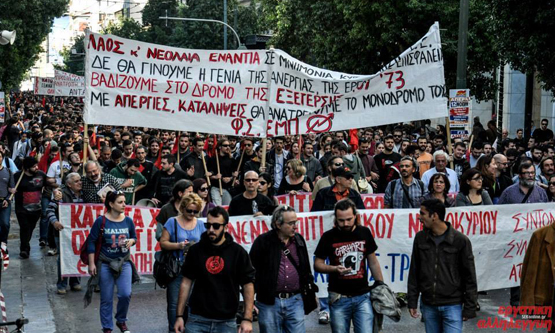
The inevitable resistance to Syriza’s sell-out has started. Across Greece, school students, pensioners, workers, the unemployed and migrants have responded. A general strike on 11 November, the first since Syriza’s re-election in late September, saw hundreds of thousands march and protest. Since the beginning of November, ferry workers, transport staff and school and university students have all challenged a third round of austerity: cuts to workers’ rights, pensions, education budgets and privatisations.
Ironically, Syriza representatives have voiced support for the protests, prompting a resident of Athens to remark that: ‘Syriza wants to take ownership of the protests but not the reforms.’ The scale of austerity mean that more and more sectors of Greek society are mobilising themselves: small shopkeepers and businesses joined the general strike as they see their own livelihoods now directly undermined by the structural reform programme of the Troika of the European Central Bank, the International Monetary Fund and the European Union. The Troika has staff in Greece permanently to ensure programme compliance and has demanded that a specific number of preparatory actions take place before the end of this year. Deregulation of businesses and professions is underway as the multinationals slaver at the prospects of increased profits and ownership. From corner shops to local bakeries, to the international ports of Piraeus and Thessalonika – everything must go, according to the third bailout agreement. The Chairman of the Athens Chamber of Commerce, Kostas Michalos stated: ‘We are likely to see thousands more small companies suspending operations and going under during the next six months’. In effect the Troika has now expanded to a foursome which directly includes the Syriza government. Syriza may bleat about the tough measures but it has signed up to fully implement them.
After the sell out – the sell off
After his re-election in September, when 45% of the electorate abstained, Greek Prime Minister Alexis Tsipras openly began auctioning off his country and its working class: ‘Foreign investors are welcome, and they will find a government with a clear mandate to bring about change to the country… In a few years, Greece will become a prime destination for foreign investment, this is my opinion and my desire.’ These are not just words pitched at the vultures of international capital but a declaration of surrender.
In early October, Syriza presented its 2016 budget. Tsipras and his wretched crew were shamelessly inventive in justifying the measures as a clever plan to extricate Greece from its situation: ‘Our main goal is to get out as quickly as possible from supervision and regain access to international markets…We have to tighten our belts.’ That is precisely what the Greek working class has been doing since the beginning of the crisis. The Organisation for Economic Co-operation and Development had just published figures showing that average Greek household income had fallen by 27.5% since 2007. It was this assault on living standards that motivated the vote for Syriza in January 2015. Prior to that election, Syriza had campaigned directly and forcefully against austerity. In words it offered a fighting way out of the crisis by completely repudiating the debts of the bankers. In deeds that rebellious stance saw first retreat and then surrender.
Now it has become the case that whatever the bankers want, they can have. Following the October budget statement, a whole number of measures specified by the previous month’s Memorandum of Understanding with European imperialism were presented to the Greek parliament. 48 ‘milestones’ had to be approved and passed. Any prevarication or delay means the implementation of the old Troika threat of withholding a tranche of bailout cash. That cash never goes near those in most need but goes to pay off Greece’s dubious multi-billion international loans, totalled at well over €315bn, as well as debts to the EU and IMF. Greece has been in recession since 2008 and will continue to be for the foreseeable future, possibly for a decade. Debt to Gross Domestic Product ratios are predicted to rise to 196% by the end of this year and continue rising through the following year to 201% while the actual economy shrinks by 2.3% this year and 1.3% in 2016. Of the €86bn Troika bailout secured by Syriza’s capitulation, the third for the country, €25bn has to be set aside for re-capitalisation of Greek banks. Addressing the needs of the people is not factored in at all in these calculations.
As strikes and protests were taking place, Troika bailout monitors were engaged in discussions in Athens regarding the detail of implementation of the measures: a 20% cut in basic pensions means that the new minimum rate will fall from €486 to €392 per month. 45% of Greek pensioners exist below the official poverty line and with the unemployment rate at 25% many households depend on the one pension payment. Means testing of state pensions is to be introduced.
The Troika has recently detected a slowing down in programme compliance over new legal measures to speed up evictions for mortgage arrears: 320,000 Greek households are in default and the maximum income to qualify for protection is being pushed lower and lower which will lead to widespread evictions. Court security is being stepped up to deal with challenges to families losing their homes. Again wider sections of Greek society are being exposed to the acute consequences of the crisis and will be forced to resist.
Greece is the test laboratory for the rest of Europe as the post-war welfare system is savagely ripped up and the deregulated market upheld as the only solution. Against the madhouse economics of capitalist disaster, only the planned economy of socialism can offer real change. Syriza’s insistence on full compliance with the Troika programme can only mean further and deeper poverty for the Greek people and the working class – there is no way out but the struggle for socialism. The people will win!




